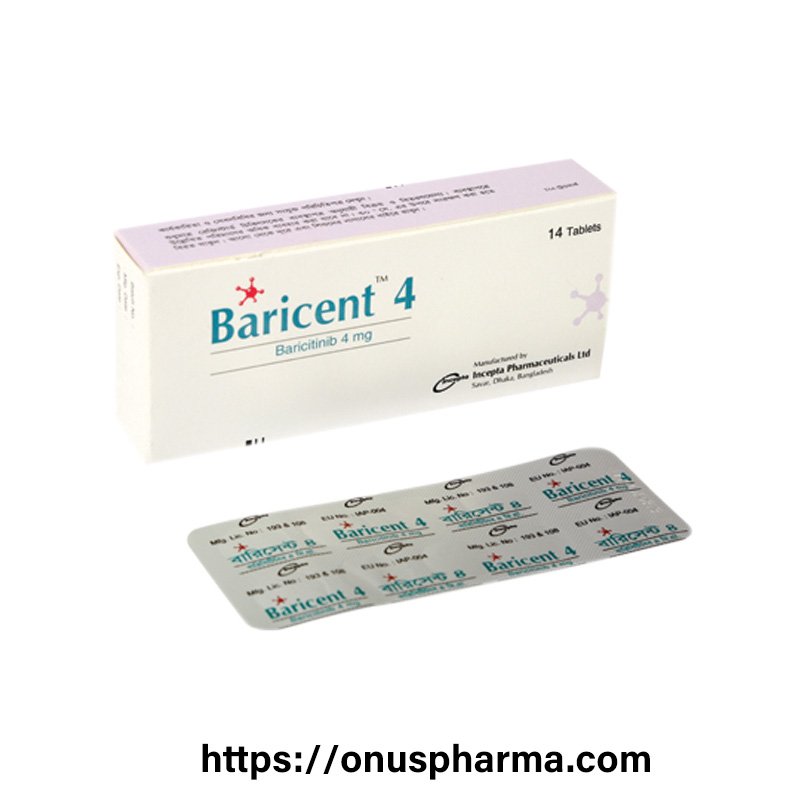Address
Road no. 4, Vatara, Notun Bazar
Dhaka, Bangladesh
Address
Road no. 4, Vatara, Notun Bazar
Dhaka, Bangladesh

Brand Name: Baricent
Generic Name: Baricitinib
Strength: 4 mg
Volume: 14 tablets
Baricitinib 4 mg tablet (Baricent) is an oral medication used to treat moderate to severe rheumatoid arthritis in adults who have not responded well to other treatments. It works by selectively inhibiting Janus kinase (JAK1 and JAK2) enzymes, which play a key role in the inflammatory signaling pathway, thereby reducing immune overactivity. Common side effects include upper respiratory infections, nausea, headache, elevated liver enzymes, and increased cholesterol levels.
Baricent oral tablet got initial approval in the U.S in 2018 for the treatment of the following indications
Limitations of use: It is not recommended to use Baricent 4 mg in combination with JAK inhibitors, biologic DMARDs, or potent immunosuppressants such as azathioprine and cyclosporine.
[saswp_tiny_multiple_faq headline-0=”h2″ question-0=”How does Baricitinib work?” answer-0=”Baricent works by calming down the body’s overactive immune system. It blocks certain enzymes called Janus kinases (JAK1 and JAK2) that send signals causing inflammation. By reducing these signals, Baricitinib helps ease pain, swelling, and redness in conditions like arthritis and eczema, allowing the body to heal and feel more comfortable.” image-0=”” count=”1″ html=”true”]
The uses of baricitinib 4 mg tablets vary among patients. General recommended dosing information is given below. Always follow your healthcare provider’s instructions before taking the medication.
Consult with your healthcare provider for dosage modification and dose reduction. Do not stop taking the Baricent tablet without your healthcare provider’s permission.
Baricent 4 mg can cause serious side effects, including
Baricent affects your immune system and can lower the ability to fight infection. Some people have had serious infections, including Tuberculosis (TB), and other infections caused by bacteria, viruses, and fungi that can spread to other parts of your body.
You should not take this medication if you have any kind of infection unless your healthcare provider tells you it is okay. You may be at a higher risk of developing shingles.
People 50 years or older who with at least one heart disease, increase the risk of death when taking a Janus kinase inhibitor. Tell your healthcare provider immediately if you see any symptoms, including chest pain, pressure in the chest, and shortness of breath.
Baricent can increase the risk of cancer, changing the way your immune system works, including lymphoma, certain skin cancers, and lung cancer in people with a smoking habit.
Blood clots in the veins of your legs, lungs, and arteries can occur in some people taking Baricent. This can be life-threatening and cause death. Blood clots in the veins of the legs and lungs more often happen in people 50 years or older with at least one cardiovascular problem, taking a Janus kinase inhibitor.
Other serious infections are
Tell your healthcare provider before taking the medication if you have
Baricent can interact with medicines that weaken the immune system, such as biologic DMARDs or strong immunosuppressants, increasing the risk of infection. It may also interact with drugs that affect kidney function or those that are eliminated by the same pathways. Combining it with blood thinners may raise the risk of bleeding, so monitoring is advised.
[saswp_tiny_multiple_faq headline-0=”h3″ question-0=”Does Baricitinib cause weight gain?” answer-0=”Weight gain is not a common side effect of Baricent. However, some patients may notice slight changes in weight due to improved inflammation or other individual factors.” image-0=”” headline-1=”h3″ question-1=”How does Baricitinib work in COVID?” answer-1=”In COVID-19, Baricent helps reduce severe inflammation by blocking JAK1 and JAK2 enzymes involved in the immune response. This action may lessen lung inflammation and prevent excessive immune reactions in hospitalized patients.” image-1=”” headline-2=”h3″ question-2=”How long does Baricitinib take to work?” answer-2=”Baricent may start improving symptoms like joint pain and swelling within 2 to 4 weeks, but full benefits can take up to 3 months, depending on the condition and individual response to treatment. ” image-2=”” headline-3=”h3″ question-3=”How much does Baricitinib cost?” answer-3=”The cost of Baricitinib depends on location, brand, and availability of the medication. The estimated cost for a whole treatment depends on the treatment duration, prescribed dosage, and other related factors. Generic Baricitinib (Baricent) will be less costly than the branded (Olumiant) one. Consult with your healthcare provider for the best solution.” image-3=”” headline-4=”h3″ question-4=”How to get Baricitinib?” answer-4=”Baricent is the only prescription medicine, which means you can get this medication from licensed medical pharmacies, authorized distributors, and from manufacturers only if you are prescribed by a healthcare professional.” image-4=”” headline-5=”h3″ question-5=”Is Baricitinib approved for alopecia?” answer-5=”Yes, Baricitinib is FDA-approved for severe alopecia areata in adults. It offers the first systemic oral treatment option for this autoimmune hair-loss disorder.” image-5=”” headline-6=”h3″ question-6=”Is Baricitinib a biologic drug?” answer-6=”No, it is not a biologic drug. It is a small-molecule inhibitor that targets Janus kinase (JAK) enzymes to reduce inflammation. Unlike biologics, it is taken orally and works inside cells to block inflammatory signaling pathways.” image-6=”” count=”7″ html=”true”]
Reviews
There are no reviews yet.